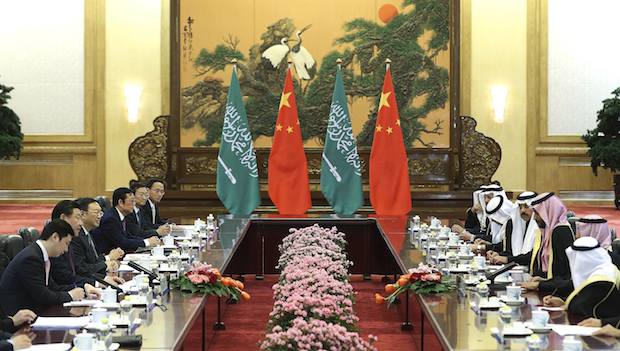
China’s President Xi Jinping (2nd L) speaks with Saudi Arabia’s Crown Prince Salman Bin Abdulaziz Al Saud (2nd R) after a welcoming ceremony at the Great Hall of the People in Beijing on March 13, 2014. (REUTERS/Lintao Zhang/Pool)
Riyadh, Asharq Al-Awsat—Saudi Crown Prince Salman Bin Abdulaziz’s official state visit to China will strengthen economic ties between the two countries and open the door for mutual investment, according to financial experts speaking to Asharq Al-Awsat.
Chinese Ambassador to Riyadh Li Chengwen highlighted Saudi–Chinese trade, affirming that China became Saudi Arabia’s largest trading partner in 2013. Speaking at a special event, Chengwen said: “Saudi–Sino relations are distinguished by qualitative development in varying industries at all levels. Saudi Arabia has been China’s largest trading partner in western Asia and Africa over the past 10 years and it is the largest state oil exporter to China.”
He added that Saudi–Chinese bilateral trade had risen 14 percent over 2012, to reach 73 billion US dollars, comfortably exceeding the trade volume target of 60 billion dollars set for 2015.
Saudi Crown Prince Salman is expected to sign a number of agreements during his time in Beijing, including economic and energy deals.
Speaking to Asharq Al-Awsat, Abdul Rahman Al-Jeraisy, the president of the Saudi–Chinese Business Council, said: “All countries view Saudi Arabia as a significant strategic partner . . . Over the past 35 years, China has become one of the Kingdom’s major and key partners.”
According to Jeraisy, the volume of trade between Riyadh and Beijing has now exceeded 76 billion dollars, confirming that the Crown Prince’s visit “comes at the right time.”
Jeraisy also praised both the Saudi–Chinese Business Council and the Chinese–Saudi Parliamentary Friendship Committee for their “pioneering role in developing ties, serving the interests of both partners and attracting major investments to Saudi and Chinese markets.”
Jeraisy said the Saudi–Chinese Business Council had played a prominent role in boosting bilateral trade between the two countries.
As for China’s commercial role in the Kingdom, Jeraisy made it clear that Chinese companies were active in construction, technology and the import/export sectors, among others.
He added that the growing relationship between the two countries was down to their “commonalities, most prominently their economic strengths,” adding that for Beijing, Riyadh stands as “the most important country across the Middle East and North Africa.”
He added: “Saudi Arabia views China as a country of great significance for many reasons, particularly since it is considered the second most powerful country in the world.”
Commenting on Crown Prince Salman’s visit, a member of the Council of the Saudi Chambers, Abdullah Zaid Al-Meleihi, told Asharq Al-Awsat that despite their relatively short historical links, Saudi–Chinese ties “have made big leaps, particularly following the visit of the Custodian of the Two Holy Mosques King Abdullah Bin Abdulaziz when he was Crown Prince.”
According to Meleihi, King Abdullah’s visit facilitated the access of Saudi companies into the Chinese market. He also pointed to the Chinese companies operating across several sectors in the Kingdom, such as petrochemicals, road construction and building infrastructure.
Speaking to Asharq Al-Awsat, the head of the Chinese–Saudi Parliamentary Friendship Committee, Abdulaziz Al-Murshed, said: “Economic relations have developed strongly over the past years. China depends on Saudi oil . . . while the Saudi market depends on imported Chinese products. China has also succeeded over the past years in attracting some of the largest industrial companies from Europe and America, which have built factories on Chinese territory for competitive prices.”
The total value of Chinese investment in the Kingdom is estimated at 18 billion dollars. More than 140 Chinese companies currently operate in the Kingdom.
